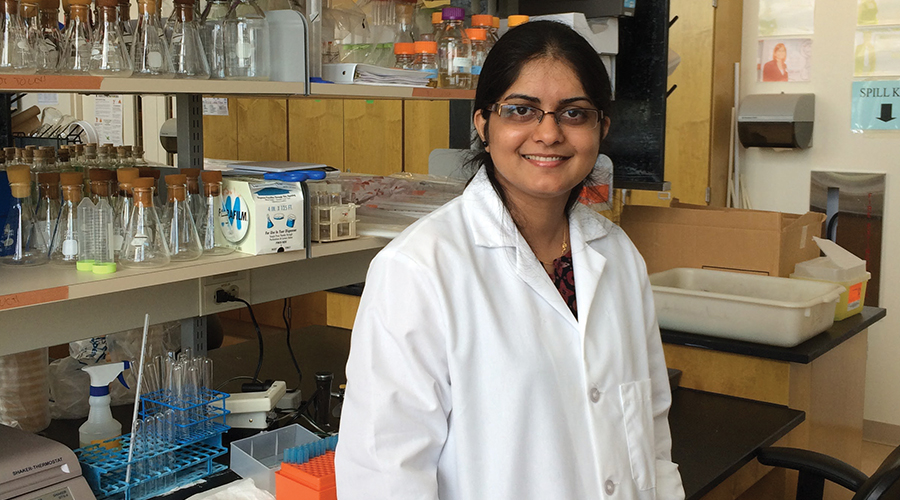
“The world of sustainability is so vast. If you really want to have influence, it’s so important that you understand all of its interconnections,” says Dr. Swati Hegde, a sustainability research specialist and instructor in Penn’s Master of Environmental Studies (MES) degree. At Penn, Dr. Hegde teaches sustainability courses designed to give students a taste of the considerations, connections, and controversies they may expect to encounter in a sustainability career—whether they focus on science and technology, law and policy, economics, or any other application. “My theme is that anyone who wants to make a meaningful contribution to the field of sustainability needs to see the big picture, however uncomfortable the learning curve gets,” she says. “Then we unlayer that big picture into its smaller components.”
In a course titled Introduction to Sustainable Development, Dr. Hegde orients students to the environmental, social, and political topics and issues that fall under the umbrella of sustainability. “It’s more of a menu than a dish, exposing students to many options they can explore further,” she suggests. “As people on this planet, we need to work towards the common goal of achieving prosperity by respecting our planetary boundaries.” Dr. Hegde’s Sustainable Resource Recovery from Wastes course is more specialized, focusing on the material aspects of supply chains and how to incorporate sustainable principles at every stage of a material’s life cycle. “The item you buy at the grocery store came from a factory, and before that an agricultural system, and so on. A plastic grocery bag has a long life cycle from fossil fuel extraction to refinement to fabricating plastic into a thin film—and then we throw it away in five minutes,” she explains. “Life cycle thinking is something that should be part of our education in schools, it should be a core value.”
In both classes, students can expect to analyze real-world examples of sustainability in action—for example, Penn’s Climate Action Plan, a company’s sustainability report—to understand what large organizations are doing to manage waste, water, energy, and other resources. For some assignments, Dr. Hegde asks students to prepare a presentation to educate fifth-graders about a topic relevant to the course. “Students cannot use a lot of jargon in that case, and they have to be very creative about how to communicate,” she comments. In other cases, the students report on real-world sustainability initiatives and make recommendations for improvement. “Not everyone is comfortable doing projects like this,” she says. “Sometimes they're out of their comfort zone when it comes to what they want to learn—maybe they are more focused on science than policy, or more focused on economics than science. You don’t need to work on all of these subjects, but, if you are in the field of sustainability, it’s very important that you understand all of them. You need to see the big picture in order to work on your niche area, and more importantly to partner with the right people to make a better impact.”
On that matter, Dr. Hegde speaks from professional experience. In her current role at the World Resources Institute, “I primarily work on ways in which we can reduce agricultural methane emissions—creating enabling environment to embed science and technology approaches to reduce methane into policies and finance,” she says. “The job I do now means a lot to me because I come from an agricultural family, and our food production systems are as efficient as they should be.” Prior to joining the World Resources Institute, Dr. Hegde worked as a Senior Academic Research Coordinator and Senior Advisor to The Water Center at Penn, which helped her develop water expertise to augment her food systems experience. “Water is central to everything,” she says. “Food systems, irrigation, urbanization, energy—they are all inseparable from each other.” Before that, her PhD research culminated in a roadmap to divert food waste from landfills in upstate New York; “I worked in a policy-oriented scientific research environment and collaborated with industries, farmers, local governments, nonprofits, and other stakeholders,” she recalls. In other words, every stage of her career in sustainability research has entailed a broad, multidisciplinary knowledge base and the capacity to partner across sectors to create change. In all this, she has always continued her passion for biotechnology and still uses her core technical knowledge in all her work.
Dr. Hegde encourages her students to make the most of opportunities to learn from and connect with other professionals in the sustainability sphere. While working for the Water Center at Penn, Dr. Hegde edited wH20: The Journal of Gender and Water, a publication founded by MES alumni which explores issues such as lack of support for women in STEM and global water issues that disproportionately affect women. She also worked with student chapters of professional organizations such as the American Water Works Association, helping them set up panel discussions and connect to career fairs and other opportunities. “Meeting and getting advice from people who work in the field can go a long way toward professional development,” she says.
“Penn students are very passionate,” she adds. “Some come in with clarity about what they want to do, but most, especially new full-time students, are full of confusion. Confusion around where one can contribute the most while making a good career is very normal. The most important thing, however is that they are open to hearing new ideas, come out of their comfort zones and learn new things, which is the greatest quality for youth in sustainability.”





